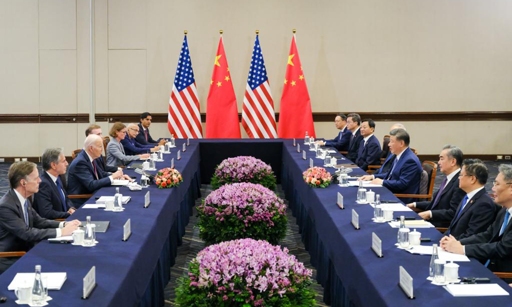Chinese President Xi Jinping said on Saturday that the Taiwan question, democracy and human rights, China’s path and system, and China’s development right are four red lines for China, which must not be challenged or crossed.
is there another source that expands on exactly what this all means or are these “red lines that must not be crossed” being left intentionally vague so that when the u.s. inevitably crosses them, party leadership doesn’t feel obligated to respond belligerently?
I thought this was a pretty good take on the statement https://xcancel.com/RnaudBertrand/status/1858019192370507904
oh, okay, so in context he’s just reiterating status quo ante. thanks!
According to the Chinese readout (https://guancha.cn/internation/2024_11_17_755645.shtml) here’s what he told Biden were the 7 “lessons of the past 4 years that need to be remembered”:
- “There must be correct strategic understanding. The ‘Thucydides Trap’ is not historical destiny, a ‘new Cold War’ cannot and should not be fought, containment of China is unwise, undesirable, and will not succeed.”
- “Words must be trustworthy and actions must be fruitful. A person cannot stand without credibility. China always follows through on its words, but if the U.S. side always says one thing and does another, it is very detrimental to America’s image and damages mutual trust.”
- “Treat each other as equals. In exchanges between two major countries like China and the United States, neither side can reshape the other according to their own wishes, nor can they suppress the other based on so-called ‘position of strength,’ let alone deprive the other of legitimate development rights to maintain their own leading position.”
- “Red lines and bottom lines cannot be challenged. As two major countries, China and the United States inevitably have some contradictions and differences, but they cannot harm each other’s core interests, let alone engage in conflict and confrontation. The One China principle and the three China-US joint communiqués are the political foundation of bilateral relations and must be strictly observed. Taiwan issue, democracy and human rights, development path, and development rights are China’s four red lines, which cannot be challenged. [Note: Bold text in the original] These are the most important guardrails and safety nets for China-US relations.”
- “There should be more dialogue and cooperation. Under current circumstances, the common interests between China and the United States have not decreased but increased. Whether in areas of economy and trade, agriculture, drug control, law enforcement, public health, or in facing global challenges such as climate change and artificial intelligence, as well as international hotspot issues, China-US cooperation is needed. Both sides should extend the list of cooperation, make the cooperation cake bigger, and achieve win-win cooperation.”
- “Respond to people’s expectations. The development of China-US relations should always focus on the wellbeing of both peoples and gather the strength of both peoples. Both sides should build bridges for personnel exchanges and cultural communication, and also remove interference and obstacles, not artificially create a ‘chilling effect.’”
- “Demonstrate great power responsibility. China and the United States should always consider the future and destiny of humanity, take responsibility for world peace, provide public goods for the world, and play a positive role in world unity, including engaging in positive interaction, avoiding mutual consumption, and not coercing other countries to take sides.”
Even this would make the world a whole lot different instead of how they affect it now
- “Demonstrate great power responsibility. China and the United States should always consider the future and destiny of humanity, take responsibility for world peace, provide public goods for the world, and play a positive role in world unity, including engaging in positive interaction, avoiding mutual consumption, and not coercing other countries to take sides.”
My 2c-
It is well understood that China and USA need each other. And that has generally been seen as a desirable situation, if only to prevent the two of us from needlessly going to war over some stupid nonsense.
US has basically outsourced all manufacturing to China, to the point that it would take a decade or more to undo that. We depend on them, they depend on us too.Most of this is just boilerplate recognition and encouragement of that fact. Stating in a great many words that China wants to continue to be a US ally. But it is also a warning, that China is not a third world nation that the US can boss around as it sees fit. So China is warning us to follow through on our word and generally be honest and do what we say.
The red line things are the real meat of that. This is an instruction / warning to Donald Trump and his incoming team. So the whole message basically says we will work with you and be friends but don’t fuck with us on these four issues.
Unfortunately, those are kind of four issues that we really should fuck with them on. USA should not turn a blind eye to human rights violations of any ally, regardless of our level of dependence on them.
And US should absolutely not support China taking over Taiwan. Not just for reasons of principle, but for our own ends- Taiwan produces an awful lot of the world’s computer chips. If China gains control of TSMC, that essentially puts them in control of the US economy because if TSMC stops sending us chips, the vast majority of the supply from Qualcomm, AMD, Apple, and others just goes away.
Our strategy so far has been to officially acknowledge the ‘One China’ policy that includes Taiwan as part of China, while simultaneously taking actions to help Taiwan stay independent. China is calling us out for that here.
Exact same genius logic was applied to Russia, and clearly geniuses in the west learned nothing from that.
Or China cuts off the US since they’re no longer dependent on US manufacturing orders. China sanctioning the US would end our economy overnight, while it wouldn’t really effect anyone but the billionaire class in China, and they’re already on the chopping block.
I would rather not find out. There’s too many wars and too many lives lost on this planet already.
Refusing to meet bad actors with unified strength and yes, violence when necessary, only encourages more bad actors and actions.
This is a universal truth too many in our peaceful time have forgotten, and so the wheel is turning back towards authoritarianism and violence.
My brother in Christ we (the US) are the bad actors.
Who’s “we”?
But, sure, sometimes everyone is. And sometimes we’re not.
Nothing is black and white, and anyone who pretends otherwise is either a simpleton or is selling you something.
No, that belief is just a coping strategy. You haven’t studied history enough. England dominated over 80% of the world’s population at it’s height. The USA broke from England over economics, primarily the crown’s intention to reform or end slavery and the crown’s restraining the colonial genocide machine from killing everyone on the continent. For almost 700 years white, European society has been traveling around the world raping, torturing, enslaving, extracting, and exploiting all of the world’s people. Every story the white European society tells about some evil doer elsewhere is primarily propaganda (true or not) to justify its continued vile dominance.
There is no future for human society that doesn’t involve dismantling everything the Europeans built on the backs of the global majority. Every current and former colony, every economic system, every legal system, every social institution, every religion - it all needs to be dismantled and rebuilt by the world’s people in accordance with the needs of those people. There is only one empire and it traces its history all the way back to Rome. It must be ended. Anyone who pretends otherwise is an apologist.
You’re right, every free nation must unite against the plague of western imperialism.
You do realize the US is the world’s worst Empire and thus the one peddling authoritarianism and violence, right?
That’s the entry criteria for the UN Security Council.
Is this a fucking joke? Are you Josep Borrell?
- List of Atrocities committed by US authorities
- A Detailed Chronological List of US Interventions, Invasions, Destabilzations, and Assistance to Oppressive Regimes (ending in 2002)
- Shock therapy (economics)
- Are We The Baddies?
- The blueprint of regime change operations How regime change happens in the 21st century with your consent
- Infographic: US military presence around the world The US controls about 750 bases in at least 80 countries worldwide and spends more on its military than the next 10 countries combined.
- Michael Parenti: Africa is Rich
- The Intercept, 2021: Meet NATO, the Dangerous “Defensive” Alliance Trying to Run the World
- CounterPunch, 2022: NATO is Not a Defensive Alliance
- Noam Chomsky, 2023: NATO “most violent, aggressive alliance in the world”
- Thomas Fazi, 2024: NATO: 75 years of war, unprovoked aggressions and state-sponsored terrorism
- Counterpunch, 2020: The U.S. Did Not Defeat Fascism in WWII, It Discretely Internationalized It
Lmfao what no materialist analysis does to a mfer
Those are some multilayered weasel words and winged words. What are you trying to sell?
What the hell are you on about?
no u
Ask Ukraine.
We’re not the audience these statements are aimed at. They’re principally aimed at China’s domestic population: to maintain the
CCP’sCPC’s appearance of strength.Imagine not to be able to spell CPC correctly.
What’s CPC?
I thought CCP was China Communist Party.
CPC is the Communist Party of China, that’s the official name of the party which people in the west insist on mispelling for some unknown reason.
It’s to draw more parallels with the CCCP and get a bit more mileage from some of their anti-USSR propaganda
very likely
Oh thanks. I shall make a correction.
To own the tanks.
Ok Steve Bannon, LMAO.
Or, instead of being a dick, you could help.
Hell, why not. The whole world of Falun Gong, the Moonies, the Unification Church, and their links to the Trump admin figures everyone loves to hate is pretty fun. I will post about it and ping you in the comments.
Easiest block. Bye.








